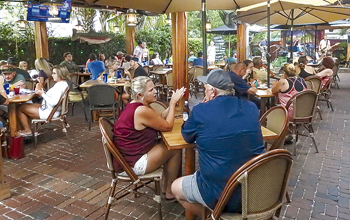HIGH SPRINGS – The Great Outdoors Restaurant in High Springs has added another chapter to the storied past of the building that originally was known as the Opera House. Built as a socially acceptable venue for entertainment in the then rowdy railroad town of High Springs in 1895, the second floor was used as an opera house, theater and social hall, and in the 1920s as a movie house.
The first silent movie, The Great Train Robbery, was shown upstairs and was accompanied by piano and violin. Later, the building was used for shows and musicals. In the 1920s, a general store and barber shop occupied the first floor.
The building went through a series of tenants over the next five decades, then finally closed its doors and remained vacant for over two years until Bob and Karen Bentz bought it in 2006 to make it into a restaurant.
They spent more than two years restoring the entire building. Today the first floor of the historic building is home to the award-winning Great Outdoors Restaurant, Springhouse Tavern, Outdoor Patio and River Bar, while the second floor is home to the Opera House Banquet and Conference Facility. The building is also on the National Register of Historic Places. For over a decade the restaurant has been a destination restaurant for locals and tourists with live bands on the patio.
When Florida went into quarantine in April due to COVID-19, all businesses deemed non-essential were forced to shut down, including the Great Outdoors. Statewide, thousands were put out of work, and the unemployment rate in April surged to over 14.7 percent. Jobs associated with restaurants and bars disappeared and employees who often worked at minimum wage plus tips were without a paycheck.
Restaurants were allowed to provide takeout or delivery, and each restaurant was faced with determining if it was profitable to keep at least some staff working. Laid off workers could collect unemployment but the system was overwhelmed, and it could take weeks or even months for payment. Most restaurants tried takeout service to survive financially, but some had to give it up when costs exceeded revenues or if their menu was not suited for takeout. For some, it meant the end of that business.
Just as other restaurants had to, when facing closure in April, the Great Outdoors had to make a decision. For the Bentz's and managers David Richardson and Michael Glazer, that decision was made based on the restaurant’s menu that didn't lend itself to takeout and that some food supplies became unavailable. The decision was made to close. “Most of our meals have several elements that would have been hard to do as takeout and the amount of takeout business versus the cost just wasn't viable,” Richardson said
With staff at the Great Outdoors facing unemployment, management searched for a way to help ease their burden. The owners gave everyone a two-week furlough to take care of their other needs. And when the Small Business Administration (SBA) Payroll Protection Plan became available, it was a way for the business to pay employees. But with the restaurant closed, the question was just what would they be paid for?
Behind closed doors, it was an opportune time to do renovations and repairs to the 125-year-old building. But financially it wasn’t feasible if the money was spent paying contractors. The tightly-knit group of staff and managers decided to do it themselves. Over the next month, the staff refinished the indoor floors, sanded and refinished the bars and outside tables, painted, put in shelving and made repairs.
“We also used this time to do a deep cleaning throughout the entire restaurant. The health and safety of our employees and guests is the most important thing,” Richardson said. “Once we reopened, we have kept that as our top priority. We want to be proactive about following guidelines on cleaning, masks and social distancing. All tables are six-feet apart and every surface is wiped down between diners.”
But with the virus still increasing, some traditions have changed at the restaurant such as a revised and reduced menu to accommodate for certain supplies that are now hard to get. Music was cancelled for a while to avoid larger gatherings, which concerned the management. But the restaurant is now featuring live bands on Friday and Saturday nights. Hours have been shortened to 11 a.m. to 9 p.m. every day but Monday.
Both Richardson and Glazer start their day by checking the health department website for a count of cases and any new guidelines. “We just have to continually stay on top of the situation to protect the health of all. No one knows where this situation is going, so we take it day by day,” Richardson said.
Glazer says the staff still talks about working on the renovations. “We made it through the shutdown, while making the place better. It kept everyone employed and gave the staff a sense of ownership in the future of the restaurant. It gave everyone a sense of pride in the renovation accomplishments,” Glazer said. Richardson agreed, “As a business it’s important to have a culture of working together as a family, it creates a stronger bond among us all.”
And that bond helped make it possible to ensure that the historic building that started out as an Opera House 125 years ago continues to prosper despite the hardship brought on by COVID-19.
# # #
Email rcarson@
alachuatoday.com
From Pandemic to Innovation, Restaurant Finds Novel Solution
Tools
Typography
- Font Size
- Default
- Reading Mode
